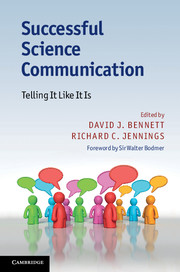Book contents
- Frontmatter
- Contents
- Foreword
- Authors' biographies
- Introduction Public engagement in an evolving science policy landscape
- Part I What it helps to know beforehand
- 1 Deficits and dialogues: science communication and the public understanding of science in the UK
- 2 Explaining the world: communicating science through the ages
- 3 Science: truth and ethics
- 4 The public's view of science
- 5 The common language of research
- 6 Not 100% sure? The ‘public’ understanding of risk
- 7 The ethos of science vs. ethics of science communication: on deficit and surplus models of science–society interaction
- Part II Policy-makers, the media and public interest organisations
- Part III What you can do and how to do it
- Part IV And finally, evaluating and embedding science communication
- Index
- Plate section
- References
7 - The ethos of science vs. ethics of science communication: on deficit and surplus models of science–society interaction
Published online by Cambridge University Press: 05 May 2013
- Frontmatter
- Contents
- Foreword
- Authors' biographies
- Introduction Public engagement in an evolving science policy landscape
- Part I What it helps to know beforehand
- 1 Deficits and dialogues: science communication and the public understanding of science in the UK
- 2 Explaining the world: communicating science through the ages
- 3 Science: truth and ethics
- 4 The public's view of science
- 5 The common language of research
- 6 Not 100% sure? The ‘public’ understanding of risk
- 7 The ethos of science vs. ethics of science communication: on deficit and surplus models of science–society interaction
- Part II Policy-makers, the media and public interest organisations
- Part III What you can do and how to do it
- Part IV And finally, evaluating and embedding science communication
- Index
- Plate section
- References
Summary
First, there is the communication of science that involves a communal effort to get at the truth in a deliberative manner. It presupposes a mutual commitment to comprehensibility, truth, adequacy, and sincerity. Then there is science communication which seeks to ensure that our knowledge societies provide a supportive environment for the responsible development of science and technology. In order to be trustworthy, science communication has to meet certain ethical requirements. These two kinds of communication are radically different in character – and this is a dilemma and moral struggle for all scientists who engage in science communication, and for all science communicators who wish to communicate not just the results and promises of technoscientific research but also wish to retain the Enlightenment ethos of science as an exemplary deliberative enterprise. This is, in short and in summary, what calls for elaboration in the following pages.
Introduction: discourse ethics, science, and democracy
One cannot formulate an ethics of science communication without considering the ethics of discourse more generally. What else is there, after all, in the communication of science or any other kind of communication: be clear and comprehensible, say what is correct or true, adhere to what is rightful or adequate to the situation, convey your sincerity and honesty! It would appear that an ethics of science communication urges adherence to norms such as these. Things are more complicated, however, and so is the current practice of what has come to be the business of science communication. The complication starts right here: the four imperatives stated above are not, in fact, norms of discourse that are more general than those of science – they originate within science itself and the tradition of the Enlightenment. It is for the sake of the intellectual progress of humankind in its pursuit of truth that the clarity, veracity, adequacy, and honesty of what we say to one another matters so much. Arguably, however, this tradition of science as pursuit of truth and of general Enlightenment has lost sway in the contemporary world of innovation, of research and development, of science centers, stakeholder involvement, and public engagement – and thus, perhaps, the four norms are anything but self-evident and have little to do with the standards of appropriateness for science communication.
- Type
- Chapter
- Information
- Successful Science CommunicationTelling It Like It Is, pp. 101 - 118Publisher: Cambridge University PressPrint publication year: 2011
References
- 2
- Cited by



